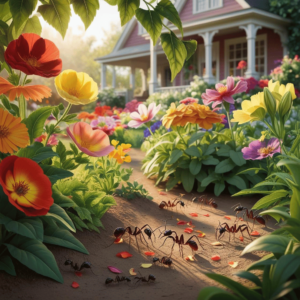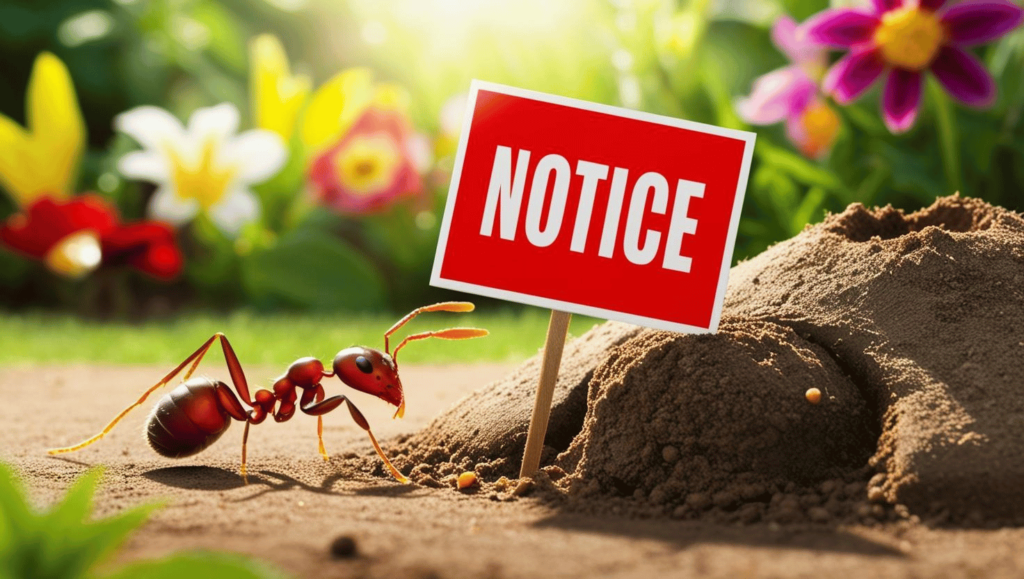Ants Have Moved In—Should I Charge Rent or Evict Them?
 If you’ve found a steady parade of ants marching through your flower garden, it might feel like you’re hosting an uninvited housewarming party. These six-legged squatters don’t knock, pay rent, or even bring snacks (unless you count their scavenged crumbs).
If you’ve found a steady parade of ants marching through your flower garden, it might feel like you’re hosting an uninvited housewarming party. These six-legged squatters don’t knock, pay rent, or even bring snacks (unless you count their scavenged crumbs).
While your initial instinct might be to grab an eviction notice—or pesticide spray—it’s worth pausing for a moment. Could these tiny tenants be freeloading pests, or are they actually pulling their weight?
Let’s dig a little deeper (ant pun intended) to uncover the truth about your new garden roommates.
Meet Your New Neighbors
Ants are the ultimate survivors. With over 12,000 species worldwide, they’re the very definition of adaptable. In your garden, they’re likely drawn by sweet nectar, aphid farms, or the allure of prime underground nesting sites. Once they settle in, they bring a combination of work ethic and bossy attitudes that can either benefit your garden or create absolute chaos.
Despite their reputation for being a nuisance, ants are more than just tiny invaders. They play vital roles in your garden’s ecosystem, performing jobs you didn’t even know needed doing. From aerating the soil to tidying up organic debris, ants can be your garden’s unintentional helpers. But let’s not get carried away with their CV—ants can also create a fair share of headaches.
The Rent They (Sometimes) Pay
Ants aren’t slipping cash under your door or Venmoing you rent payments, but their contributions to your garden might surprise you. Here’s why they might actually be worth keeping around.
- Soil Aeration: Ants are nature’s construction workers. As they dig their elaborate tunnel systems, they naturally aerate the soil, improving water drainage and oxygen flow to plant roots. This process mimics tilling, except you’re not the one sweating under the sun. Think of them as tiny, unpaid landscapers, helping your garden thrive one tunnel at a time. A well-aerated garden leads to stronger plants, healthier root systems, and fewer problems with water pooling. So while ants may seem like uninvited squatters, they’re actually improving your garden’s living conditions.
- Pest Cleanup Ants have another surprising skill: they’re expert scavengers. Dead insects? Fallen leaves? Random bits of organic waste? Ants gobble it all up like it’s a buffet. By cleaning up debris, they prevent the buildup of waste, which helps keep your garden disease-free. This pest control service doesn’t stop at dead bugs. Some ants hunt live pests, such as caterpillars or termites. So the next time you spot ants hauling off a fallen leaf, consider it their way of saying, “Don’t worry, we’ve got this.
- Pollination Partners While they’re not as effective as bees or butterflies, ants occasionally dabble in pollination. As they crawl across flowers searching for nectar, they inadvertently transfer pollen from one bloom to another.It’s not their primary job, but every little bit counts. Think of them as your backup pollinators, stepping in when the A-team is unavailable.
- Seed Dispersal Here’s a fun fact: ants are also gardeners. They’re drawn to seeds coated with elaiosomes—tasty, nutrient-rich attachments that plants produce to attract them. After carrying these seeds back to their nests, ants discard them in nutrient-rich soil, effectively planting them. If you’ve ever noticed wildflowers mysteriously sprouting in unexpected places, ants might be the reason. Without realizing it, they’ve become your garden’s secret propagators.
The Unwelcome House Guests
Of course, ants aren’t all sunshine and roses. For every helpful task they perform, there’s an equally frustrating downside. Sometimes, they overstep their boundaries, creating problems that make coexistence a challenge.
The Aphid AllianceIf ants had a business card, it would say “Professional Aphid Farmers.” Ants have a notorious sweet tooth, and aphids supply the goods in the form of honeydew—a sugary substance aphids excrete. In exchange for this treat, ants act as bodyguards, protecting aphids from predators like ladybugs.
The problem? Aphids are plant-destroying machines. They suck sap from leaves and stems, leaving your plants weakened and vulnerable. If your roses look chewed up, or your tomatoes are struggling, ants and their aphid farming operation could be the culprits.
Unwanted Nesting: While ants’ tunneling improves soil structure, nests built too close to plant roots can cause serious damage. Plants with compromised roots may struggle to absorb water and nutrients, leading to stunted growth or even death. Fire ants, in particular, can turn a pleasant gardening session into an extreme sport. Their aggressive nature and painful bites make them the worst kind of garden tenant.
Picnic Crashing: Ants don’t respect boundaries—especially when food is involved. If you enjoy outdoor dining, ants will boldly raid your picnic like they’re entitled to your snacks. Sandwiches, chips, fruit—it’s all fair game. Their persistence can quickly turn a relaxing afternoon into a full-blown food defense mission.
Should You Evict Them?
Deciding whether to keep or kick out ants isn’t straightforward. Ask yourself these questions:
- Are they damaging plants or creating structural issues?
- Are they farming aphids on your prized flowers or veggies?
- Are they more helpful than harmful overall?
If ants are wreaking havoc, it might be time to give them the boot. However, if they’re quietly doing their thing and contributing to your garden’s health, you may want to let them stay.
Natural Ways to Manage Ants
If eviction seems necessary, there are plenty of eco-friendly methods to handle ants without resorting to harmful chemicals.
Diatomaceous Earth This natural powder is harmless to humans and pets but deadly to ants. Sprinkle it around garden beds, along trails, or near nests to deter them. It works by damaging their exoskeletons, which encourages them to move along.
Citrus Peels and Essential Oils Ants hate strong scents like citrus, peppermint, and cinnamon. Scatter citrus peels around your garden or spray essential oil mixtures near their trails. As a bonus, your garden will smell amazing!
Vinegar Spray A simple solution of equal parts vinegar and water can disrupt ant trails, making it harder for them to navigate. Spray it along entry points or problem areas to encourage them to relocate.
Boiling Water For severe infestations, pouring boiling water directly into a nest can be effective. Be cautious around plants, though—you don’t want to accidentally harm your garden in the process.
Living in Harmony
If you’re not ready to declare war, it’s possible to coexist peacefully with ants. Here’s how to strike a balance:
Limit Aphid-Friendly Plants Monitor plants prone to aphid infestations, such as roses, sunflowers, and tomatoes. Regularly check for and remove aphids to cut off ants’ honeydew supply.
Plant Companion Herbs Certain herbs, like lavender, mint, and marigolds, naturally repel ants. Planting these around your beds can create a barrier that keeps ants out of sensitive areas.
Encourage Birds Birds are natural predators of ants. Set up feeders to invite them into your garden. Not only will they help control the ant population, but they’ll also add a touch of wildlife charm.
The Final Verdict
 So, should you charge rent or evict your ants? The answer depends on the situation.
So, should you charge rent or evict your ants? The answer depends on the situation.
If they’re causing harm—damaging plants, farming aphids, or creating general chaos—it’s time to show them the door. But if they’re aerating soil, cleaning up waste, and planting seeds, they might be worth keeping around.
Ultimately, gardening is about balance. A healthy, thriving garden often includes a mix of creatures, even ants. Whether you decide to charge rent or post an eviction notice, one thing’s for sure: with ants around, your garden will never be boring.
So the next time you spot an ant hauling a crumb or patrolling its aphid herd, pause to appreciate its work ethic. Maybe, just maybe, these tiny tenants are more valuable than you think.


